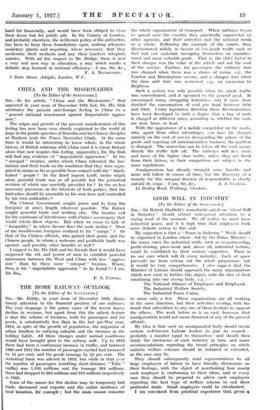CHINA AND THE MISSIONARIES
[To the Editor of the SPECTATOR.]
Sm,—In his article, " China and the Missionaries," that appeared in your issue of December 18th last, Dr. Hu Shih attributes the present anti-foreign feeling in China to a " general national resentment against Imperialistic aggres- sion."
The origin and growth of the present manifestation of this feeling has now been very clearly explained to the world at large in the public speeches of Borodin and his Chinese disciples at Hankow (vide the Times, December 22nd). At the same time it would be interesting to know where, in the whole history of British relations with China (and it is Great Britain alone that now inspires this feeling, apparently), Dr. Hu Shih will find any evidence of " imperialistic aggression." In the " unequal " treaties, under which China tolerated the bar- barians and their trade on the condition that they were segre- gated in camps as far as possible from contact with the " black- haired " people ? In the fixed import tariff, under which alone peaceful trade was at all possible but the periodical revision of which was carefully provided for ? In the no less necessary provision, in the interests or both parties, that the barbarian should be amenable to his own laws and controlled by his own authorities ?
The Chinese Government sought peace and to keep the foreigner at arm's length wherever possible. The British sought peaceful trade and nothing else. The treaties call for the minimum of interference with China's sovereignty that would attain these objects. But when we come to talk of " inequality," in whose favour does the scale incline ? That of the troublesome foreigner confined to his " camps " ? Or that of the Chinese officials, who gained their point, and the Chinese people, to whom a welcome and profitable trade was opened—and possibly other benefits as well ?
I suggest to Dr. Hu Shih and his friends that it would have surpassed the wit and power of man to establish peaceful intercourse between the West and China with less " aggres- sion " than by these same " unequal " treaties. Where, then, is his " imperialistic aggression " to be found ?—I am, Sir, &c., F. S. UNWIN.


































 Previous page
Previous page